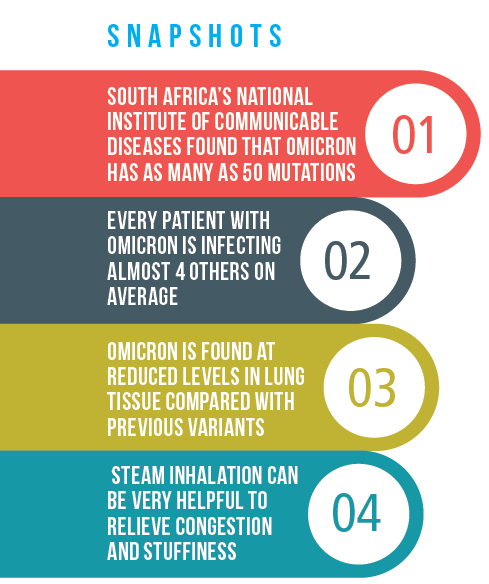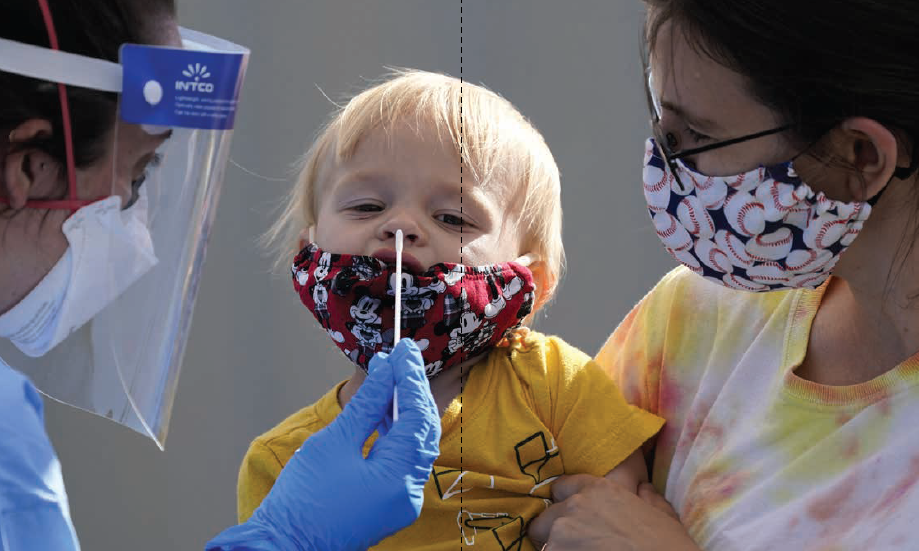The new wave of Omicron has only just started and spread over the world so rapidly, it has left us with a lot of questions like what makes it different? Is it milder? Is it just an upper respiratory disease? The writer is looking for answers to these questions
By Abhijit Chanda
THIS new variant of COVID-19 – B.1.1.529, otherwise known as Omicron, is the latest variant of concern as we continue through the COVID-19 pandemic. Seemingly spreading a lot quicker than Delta, hospital beds are once again filling up. On the whole, it seems our medical infrastructure and medical personnel are better prepared for what’s to come. Dr Ashutosh Shukla, Senior Director of Internal Medicine and Medical Advisor at Max hospital, Gurugram, has noted that the number of healthcare workers getting infected is not that high and remains at around 7-8 percent. Since this wave has only just started and spread over the world so rapidly, it has left us with a lot of questions like what makes it different? Is it milder? Is it just an upper respiratory disease?

We will answer all these questions and more by seeing what the most reliable scientific sources say about it. Please note that these answers are all very preliminary, based on early data and mostly taken from preprint studies, and even some animal studies. This means as time goes on, these findings may change somewhat as new data comes in. What is the omicron variant?
WHAT IS THE OMICRON VARIANT?
As you probably already know, Omicron was initially discovered and studied at South Africa’s National Institute of Communicable Diseases (NICD) in Johannesburg. They found that Omicron has as many as 50 mutations. Out of these, 32 changes are to its spike protein, which the virus uses to latch onto our cells and infect them. The spike protein is also the part of the virus that most vaccines have focussed on replicating. This makes this variant particularly dangerous since Omicron has mutated a lot from the first variant, which the vaccines are based on. However, since we still have a lot of the spike proteins still remains the same as its predecessors, this means our antibodies will have a fighting chance against them. But we will get to this point a little later in the article.
Even though it’s a bit early to assign a number, Omicron seems to be far more infectious than the earlier variants of concern. Some sources say it’s 2 to 3 times more infectious than Delta, while others measure the Rt to be shockingly high (Rt indicates the number of people one patient will infect at a particular time instead of R0 or R-naught is the initial measure of how many people one patient will infect). This number can be affected by people’s immunity, seasonal weather patterns, public health interventions, and other limits on viral transmission.
By early December 2021, the NICD reported the Rt of Omicron had shot up to 2 across most of the country and 2.5 in the more densely populated provinces like Gauteng. In the UK, this number is even higher at 3.7! That means every patient with Omicron is infecting almost 4 others on average.

WILL THE VACCINES OR PREVIOUS INFECTIONS HELP AGAINST OMICRON?
In a paper published in Nature in September 2021, Paul Bieniasz, a virologist, and his team engineered a mutated version of this spike protein, which shares many of the mutations in Omicron in a virus that can’t cause the disease. They found it was resistant to the antibodies of people who had been double vaccinated or had recovered from COVID-19. So this variant will undoubtedly have many breakthrough cases and reinfections, so please don’t let your guard down.
However, that doesn’t mean immune responses from the vaccines or previous infections won’t help. As with most things, the matter isn’t black and white. Immunity studies have suggested that the antibodies you have will lower your chances of suffering from severe COVID-19 since they will be able to recognise other parts of the spike proteins that haven’t changed. This means the chances of you needing to be hospitalised will be much lower thanks to the vaccines. And the booster may help even more.
Shabir Madhi, a vaccinologist, University of the Witwatersrand, told Nature.com: “We’re going to see a surge of cases. We’re going to see lots of breakthrough infections, lots of reinfections. But there’s going to be this unhinging of the case rate in the community compared to the hospitalisation rate”.
Children under 5 have a lower risk of severe disease and hospitalisation due to the Omicron variant as compared to Delta
IS OMICRON MILDER THAN DELTA?
Initial reports do suggest that it is. However, the World Health Organization’s director-general, Tedros Adhanom Ghebreyesus, said, “While omicron does appear to be less severe compared to delta, especially in those vaccinated, it does not mean it should be categorised as ‘mild,’. Just like previous variants, Omicron is hospitalising people, and it is killing people.”
But let’s see some of the science behind it. In a preprint study, researchers looked for the difference in hospitalisation rates and severe symptoms between infected people towards the end of the delta wave and during the early days of the omicron wave.

They found that the risk of going to the ER dropped by about 70% from Delta to Omicron, and the relative hospitalisation risk dropped by about 50% (from 4% to 2%). The risk of a hospitalised person being admitted to ICU fell from 0.8% to 0.4% (or by 50%) and that of needing a ventilator fell from 0.4% to 0.1%.
They also did consider that about 60% of the people they studied were vaccinated. However, with further analysis, they have determined that there is something inherent about the Omicron variant that makes it less dangerous to most people.
These findings have been corroborated by scientists in South Africa and the United Kingdom. However, the researchers also found that the risk of hospitalisation for the older population or people with pre-existing conditions is still relatively high.
So, please, don’t let your guard down. Hand washing, masking, staying away from crowded places are essential, as is getting vaccinated first, if you haven’t already, and then getting the booster.
Virologists found that the animals infected with Omicron had ten times lower virus concentrations in their lungs than those infected with other variants
DOES OMICRON ONLY AFFECT URT
Some animal studies do seem to suggest so. Michael Diamond, Virologist at Washington University in St. Louis, Missouri, et al., turned to mice and hamsters to look for an answer. They infected these animals with several variants of COVID-19, including Omicron. They found that the animals infected with Omicron had ten times lower virus concentrations in their lungs than those infected with other variants. Other teams have also noted that Omicron is found at reduced levels in lung tissue compared with previous variants. However, we should keep in mind that these are from preprint studies and animal subjects. Even though the results are encouraging, this doesn’t mean that the infection will completely stay out of the lungs. People with preexisting conditions are still vulnerable, and the spread of this variant should be as restricted as possible. That means the same restrictions of self-quarantining, handwashing and sanitising, wearing masks and avoiding crowded places are essential to keep this variant at bay.
We must also remember that Omicron is far more infectious than the previous variants. This means it’s far easier to spread. Hence, we need to be more cautious, especially around elderly and vulnerable people.
So, if it’s less dangerous, why don’t we just get infected and get it over with?
Omicron is relatively less dangerous, or so it seems so far, but that does not mean you should go out and get infected on purpose. This is still COVID-19 and it is killing people, as quoted from WHO’s Director-General in the previous question. We still don’t understand the circumstances behind the occurrences of severe disease, long COVID or any of the other comorbidities this disease can induce so none of us can say for sure what effect it can have on you or the people you pass it on to. So please, be as careful and vigilant as you have been in the last two waves and make sure you stay home as much as possible, mask up and wash your hands.
WHAT ABOUT CHILDREN?
According to a preprint study, children under 5 have a lower risk of severe disease and hospitalization due to the Omicron variant as compared to Delta. However, the recent deaths of 7 children in New Delhi are testimony to the fact that children aren’t immune to COVID, especially if they have comorbidities. Our kids need to be protected just as much as everyone else. If your children are old enough, please try and get them vaccinated as well.
WILL STEAM INHALATION HELP?
One of the most persistent and pervasive myths on preventing COVID-19, and now especially Omicron, since it’s thought to affect mostly the upper respiratory tract, is that it can be prevented with steam inhalation. This is, unfortunately, false and unfounded.
First, the COVID-19 virus can get into deep tissues very quickly where they will not be susceptible to any change in temperature brought on by the steam inhalation.
Second, since Omicron seems to be a primarily upper respiratory infection so far, that doesn’t mean it won’t infect your lungs. That’s exactly what’s happening to those who are being hospitalised.
Finally, steam inhalation can be very helpful to relieve congestion and stuffiness, which will probably follow as you begin to recover. Use it sparingly when you need it, but please don’t do steam inhalation on a regular basis as it has a risk of damaging the delicate tissues in your nose and throat, and may even increase your chances of other forms of infection.
All that said, we hope these answers helped you. As we said earlier, Omicron has only just arrived and we still need to learn a lot more about it. So it’s always wise to stay on the safe side and isolate ourselves as much as possible to protect ourselves and our loved ones. We hope you stay safe and healthy.
